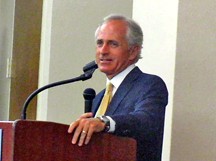
- JB
- Senator Corker at MAAR
Bob Corker, the junior U.S. Senator from Tennessee, made it clear Monday, in a talk to the Memphis Area Association of Realtors on Poplar, that he doesn’t think the spending cuts provided for in the last-minute congressional settlement of the debt-ceiling crisis were sufficient.
Corker, a Republican, was the author of a spending-cap bill — “the only bill that was bicameral and bi-partisan” — that, over a 10-year period, would have trimmed the nation’s deficit by some $5 trillion, a sum he contrasted with the $4 trillion figure that many in Congress had regarded as “the magic number” for reduction and with the $2.5 trillion in cuts, now and later, that was actually mandated by the final bill.
The bill wasn’t enough, it was “kind of like kissing your sister, I guess, not exactly what we had in mind.” But it was a start, said Corker. His more striking statement was a piece of advice for the newly appointed “super committee” of 12 congressional members — evenly divided by chamber and by party and charged with finding a debt-reduction formula by Thanksgiving.
The senator said that “tax reform” needed to be taken into account, along with line-item reductions per se. Inasmuch as that phrase is a mite ambivalent and has so far lent itself more to Democratic rhetoric than to the GOP party line, Corker’s suggestion was something of a revelation.
In point of fact, during the climactic negotiations over raising the debt limit Republican congressional leaders had shied away from tax talk, whether coupled with the word “reform” or not, as if shielding themselves from a plague.
Spelling out what he had mind, Corker envisioned a closing of loopholes and the possibility of “flattening and broadening the tax code” so as to raise ample revenue while lowering the tax rate for most people.
Corker acknowledged that he had sought an appointment to the 12-member super-committee- “which was right up my alley” — and was disappointed not to be named.
Corker’s espousal of “tax reform,” which he said would unleash “a tremendous energy in the country,” was not the senator’s only deviation from GOP orthodoxy.
He also advocated a “six-year transportation bill” that sounded vaguely like what Democrats mean when they talk about spending money on the nation’s infrastructure.
And, in a formulation that contrasted with the resurgent “supply-side” thinking that now seems to dominate most Republicans in Congress, Corker said plainly, “You’ve got to have demand. Demand is soft right now.”
Corker also offered general praise for the educational reforms now being advanced by the Department of Education under Secretary Arne Duncan — especially what he saw as the Obama administration’s distancing itself from No Child Left Behind.
The senator noted that he had joined other members of the state’s congressional delegation in supporting Governor Bill Haslam’s request that Tennessee be granted a waiver from NCLB.
Corker got on the same page as other congressional Republicans in his disapproval of Obama’s health-care program — called “Obamacare” in GOP boilerplate — and made it clear he thought the bill was not only “unworkable” but certain to be found unconstitutional by the Supreme Court on account of its mandating that citizens purchase health insurance.
Given the nature of his audience, it was hardly surprising that Corker was asked a number of questions about his views on reviving the slumping housing market. Among other things, the senator made it clear that he did not favor removing mortgage-deduction provisions from the tax code and did favor measures to ease the current home foreclosure logjam.
Surprisingly, given his membership on the Senate Foreign Relations Committee and his prominence as an advocate of rethinking policy toward countries like Afghanistan and Pakistan, Corker got no questions from the MAAR audience about the ongoing overthrow of Libyan leader Moammar Gaddafi by rebels.
Asked about that situation afterward, Corker said it was “hard not to be excited” over the deposing of long-term dictator Gaddafi, but he cautioned against direct American entanglements in yet a third theater of conflict in the Middle East.